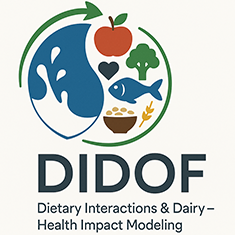DIDOF
This project aims to identify optimal combinations of food group intakes, particularly considering dairy, to minimize health burden through advanced integrative optimization models.
The dietary solutions provided by these models will include optimized trade-offs between health promotion and environmental sustainability.
Unlike most approaches, this project evaluates the combined effects of the intake of all food groups that are relevant for the development of non-communicable diseases.
Using dose-response data and dietary optimization, it aims to reduce the health burden in Denmark while integrating sustainability aspects.
While health is officially recognized as a key part of sustainable diets, it has not yet been fully included in their development. One reason for this is that quantitative tools to assess combined health effects of shifting food group intakesare still lacking.
Most existing research on sustainable and healthy diets focuses on the fulfillment of nutritional recommendations. Furthermore, most studies investigate the health impact of changing the intake of single food groups without accounting for the health impact of inevitably occurring changes in the intake of other food groups.
This applies to both replacement effects in the diet and the interaction of a changed relative risk (RR) for the overall burden of disease. Hence, traditional approaches in nutrition research limit our understanding of the real-word health impacts of dietary changes.
For example, while dairy intake has been linked to reduced risks of obesity, hypertension and type 2 diabetes, little is known about the broader health implications when dairy intake is increased or decreased, including how such changes affect the health effect of the modified diet.
This project addresses this gap by developing methods to optimize the cumulative health impact a diet that aligns to Danish nutrition habits as far as possible while implementing its environmental properties.
It does so by building on the basic risk of the Danish population to develop those NCDs, which are responsible for the majority of disability-adjusted life years (DALYs), such as type 2 diabetes, cardiovascular disease, stroke, and age-related dementia.
As the intake of each food group affects each risk differently, all accumulated effects will be considered. These effects will be calculated from evidence-based dose-response relationships originating from meta-regression analyses.
The study is structured into four work packages:
WP1: Development of a comprehensive database compiling dose-response relationships between individual food group intake and relative risks of NCDs, alongside related environmental indicators.
WP2: Using the database to calculate current health impacts (e.g., DALYs/QALYs) linked to food group consumption patterns and their environmental footprints.
WP3: Modelling optimized dietary scenarios to maximize health benefits (QALYs) while considering environmental constraints and realistic food group trade-offs.
WP4: Integrating results into a final assessment to inform sustainable diet guidelines that balance health and environmental outcomes.
Internal researchers
| Name | Title | Phone | |
|---|---|---|---|
| Alexandr Parlesak | Associate Professor | +4535323120 | |
| Inge Tetens | Professor | +4535332127 | |
| Talia Theresa Masino | Research Assistant | +4535331875 |
Eksternal researchers
| Name | Title | Institution |
|---|---|---|
| Christina C. Dahm | PhD, Associate Professor | Department of Public Health (DPH), Department of Epidemiology, Aarhus University (AU), Denmark |
| Daniel Borch Ibsen | PhD, Associate Professor | Department of Public Health (DPH), Department of Epidemiology, Aarhus University (AU), Denmark |
| Anja Olsen | PhD, Professor | DPH, AU, Bartholins Allé 2, 8000 Aarhus, Denmark |
Funded by
Arla Food for Health (AFH).
Project period: February 2025 – January 2027.
Contact
Professor Inge Tetens, ite@nexs.ku.dk

